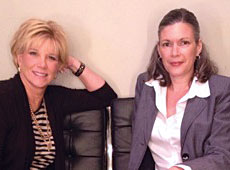
Award-winning journalist and author Joan Lunden and I met recently to talk about eldercare issues. Joan’s mother is 94 years old and happy in a small care home after living for years in the community with home care.
Joan, a physician’s daughter, talks with family caregivers around the country as part of her mission to educate people about the challenges of eldercare.
The observations she shared in our conversation deserve attention from LTC providers looking to meet the needs of residents and their families. As a spokeswoman for family caregivers, her experience echoes that of millions of families across the country.
1. Help people choose the right level of care for their loved one.
The small care home was the third placement for Joan’s mother once she could no longer live in the community.
Lunden: When I finally moved my mother into a facility, I moved her into a place that would have been great for my mother 10 years ago. I moved the mother that was in my head. In reality, the beautiful dining room scared her because she didn’t recognize people, she was alone in her apartment when she started sundowning. The place terrified her. I had chosen the completely wrong facility.
As LTC providers, who recognize the toll it takes on elders and their family members to move from facility to facility, we can do more to help families find a placement that meets the needs of their loved one.
- We can strive to provide the family with a realistic assessment of needs and what a facility can offer.
- We can refer residents to other levels of care within our systems.
- We can build relationships with other facilities so that we refer potential residents to each other.
2. Assist families with the transition to parenting their parent
Joan points out that shifting the roles in the family can be very challenging.
Lunden: When you get to that life transition when you become the parent to your parent, it doesn’t feel natural because you’ve spent a lifetime learning to be a child to them and they have always been in that parental position. To all of a sudden have that role reversed is very disconcerting to a lot of people. It’s a hard one to accept. It often feels uncomfortable to tell your parent what they can do or can’t do.
Some families come to us having negotiated the shift in roles for years, but more often we find adult children and their loved ones struggling to find a way to handle dramatic role changes in the midst of a health crisis.
We can assist families with the role transition when we:
- Offer family education groups.
- Refer to counseling resources in the community.
- Recommend written resources such as David Solie’s book, “How to Say It to Seniors” which focuses on the communication challenges between adult children and their aging parents.
- Use our consulting psychologists to help the team with challenging family issues.

3. Provide an opportunity for staff to take a break
Joan offers a place for caregivers to recharge through her Camp Reveille.
Lunden: The emotional strength that comes from getting a group of 150 women together is really powerful … They go back not just refreshed, but I feel a lot of them experience a transformation and are able to let go of a lot of baggage they didn’t even know they were carrying around.
Professional caregivers need a place to recharge too. We absorb so much pain and loss in our work. We get used to it, sure, but wouldn’t it be amazing to let it go for a long weekend? Imagine holding a contest at your facility and sending the lucky winner to Camp Reveille as part of a campaign to recognize the importance of self-care in our difficult work.
4. Educate families about making the most of visits.
Joan stressed the need for families to stay involved when their loved one is placed in long-term care.
Lunden: Don’t drop them off. They might think, “They don’t even know I’m here. Does it matter if I go?” It does matter and it matters for two reasons. Number one, even if it doesn’t seem like they know you’re there, they do know and there’s a feeling of contentment with your visit. And the second thing, the more you go and talk about what they were like as a younger person and the people in the facility hear that, it allows them to be better caregivers.
This is excellent advice and part of a host of suggestions we should be offering families when they entrust their loved ones to our care. As part of good customer service and to help residents and families integrate into our facilities, we can offer them:
- Suggestions about how to communicate with those who have dementia.
- Guidelines for taking a resident off-campus.
- Information about how our facilities work (such as The Savvy Resident’s Guide), so that family members don’t transmit their anxiety to residents.
- Recommendations regarding ways to personalize the room.
5. Educate residents and family members about medication compliance upon discharge
Joan discussed the impact of medication costs on compliance.
Lunden: The Walgreens survey found that one in five people were skipping doses to make a prescription last longer or not getting them refilled. And one in four said that when a doctor wrote a prescription for them, they never got it filled … [You] can get some savings when you sign up for Medicare Part D … ask if there is a preferred pharmacy network so you can get the lowest co-pays.
With the concern in our industry about rehospitalizations, we would be wise to send our residents off not just with prescriptions and a list of when to take each pill, but also with:
- A discussion of how they can obtain their medications given the possibility of limited mobility.
- An emphasis on the importance of medication compliance in order to maintain themselves in the community.
- A review of ways they can reduce their medication costs to increase their likelihood of compliance.
Conclusion
As service providers, we benefit from addressing the needs of family caregivers like Joan Lunden:
- More informed and less anxious families are able to make better decisions on behalf of their loved ones.
- Meeting the emotional and practical concerns of families can lead to increased satisfaction with our services.
- Addressing these needs as an added service is a great way to distinguish ourselves from our competitors.
Eleanor Feldman Barbera, PhD, the author of The Savvy Resident’s Guide, is an accomplished speaker and consultant with over 16 years of experience as a psychologist in long-term care. This blog complements her award-winning website, MyBetterNursingHome.com, which has more on how to create long-term care where EVERYBODY thrives.





